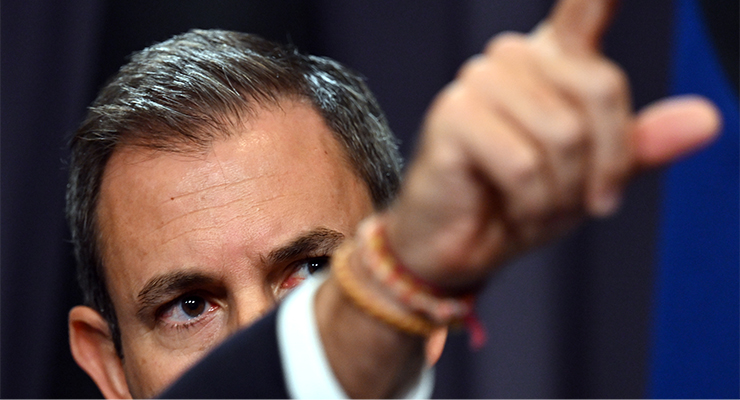
It’s important to remember, as seemingly few do, that the stage three tax cuts were legislated in 2019 when the budget was expected to enter surplus the following year. Instead, the Morrison government dramatically increased spending and permanently expanded the size of government, not just in the pandemic but projected deep into the 2030s.
Any discussion of the tax cuts beyond the respective levels of the Greens (tax cuts are bad, we need more tax, lots more, now) and the Financial Review (trickledown economics works, the only things wrong with the economy are taxes are too high and we pay workers too much) needs to grapple with this change in circumstances.
That makes life easier for the Greens and other critics of the tax cuts: they are the ones adopting a position of fiscal responsibility. We have decided — all of us, including the Coalition — that the federal government has needed to increase in size from approximately 24.5% of GDP to 26-27% of GDP (i.e. an increase of more than 5% in the total spend). So how will we pay for it? For starters, by not giving ourselves a big tax cut in 2024.
It doesn’t matter which area of expanding expenditure the Greens, or Guardian Australia, or Green Left, or anyone else claims can be “funded” by ditching the tax cuts. Money is fungible. Using it to fund the NDIS or aged care just reduces pressure elsewhere to find savings, like in defence spending.
Advocates of the tax cuts, like the neoliberal deadenders at the Financial Review, have the opposite problem. Whatever the situation in 2019, to support the tax cuts now is to support fiscal recklessness. They are funded entirely by borrowings — and at a time when we face an extended run of budget deficits.
If you have a problem with this, blame Scott Morrison and Josh Frydenberg, who dramatically expanded the size of government in Australia. But you still need a solution: either you find expenditure savings elsewhere to match the tax cuts, or you find other taxes that you want to increase in order to fund them.
Commentators love to talk about cuts in government spending without ever specifying exactly which spending should be cut. From the comfort of your think tank, or your press gallery desk, or your editorial office, it’s easy to airily suggest a bit of budget discipline would fix everything, without spelling out which hospitals or schools you think should be closed, which people with disabilities should miss out on services, which seniors should spend their last months in misery in an aged care home.
To be good faith participants in the debate about the tax cuts, advocates should be doing precisely that: which parts of the NDIS would you cut? Are you happy to see seniors continue to rot in understaffed and underresourced nursing homes? Which kids should miss out on school funding?
Alternatively, they can find another tax that can offset the tax cut. At Crikey, we’ve suggested over and over that the taxation and royalty treatment of gas exports is a fiscal disaster and there are billions flowing to foreign shareholders that rightly belong to Australians.
Or there is further reducing super tax concessions. Dumping negative gearing. Ending the franking credit or the novated lease rorts. Perhaps the Financial Review can lead a campaign to end taxpayer subsidies for rich housing investors, or increase taxes on its fossil fuel company advertisers.
Anything less is disingenuous in a debate with growing heat but not much light.








just read a succinct (and angry) comment on the tax cuts by Richard Denniss in the Guardian, which is in the same vein as this and is worth a read.
Also adding to the argument for ditching the tax cuts, is the fact that the Morrison government painted a very unrealistic picture, in regards to the health of various programs. For instance, they claimed that Medicare and bulk billing had never been in better shape. When in reality, it there was a deepening crisis, that is still grinding on. They also claimed that they were doing a world leading job in cutting carbon emissions. Which was obviously not the case. So, there’s just a couple of areas that a huge amount of money has to be spent, in order to overcome their long-term negligence; and that money has to come from somewhere.
Important discussion that we need to have
Blow the dust off the Henry Tax Review. Most of it is still relevant, and untouched.
Yep. Sadly, in the decade and more since it was released, almost none of the recommendations are in place.
Reading Bernard’s insightful and perspicacious piece is another reminder of why I am pleased and satisfied to be a Crikey subscriber. As I have said before, the only regret that I have is that I did not sign up years earlier. Bernard has expressed my views on these tax cuts, “to a T”, only he does so in a far more fluent, articulate and detailed way than I could.
And, for the record, (don’t worry, I know that no one will really care but …) I do NOT want my stage 3 (or indeed any other type of) tax cut in 2024 (or at any other time). I am a lowly, old now, fully retired part-pensioner but I am still happy to make a contribution to what should be a civilized and caring society, especially at this difficult time. So, ….. stick your tax cuts….. up your jumper (will do).
And perhaps how many hospitals, school upgrades, more teachers, aged care workers, nurses, GPs. that tax cut to the rich would finance if it weren’t to go to buying New Porsches, investment properties, Kellie bags and Jimmy Choo shoes, which is where that rich end of town tax cut will end up..